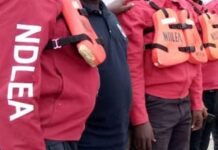The National Space Research and Development Agency (NASRDA) says it is engaging space science technology to boost agricultural products for food security in the country.
Dr Rakiya Babamaaji, the Head, Natural Resources Management Division of NASRDA, disclosed this on Monday in Abuja during an interview with the News Agency of Nigeria (NAN).
Babamaaji explained that space science technology could be deployed into agriculture through the application of Geospatial technology that involved Remote Sensing and Geographic Information System application.
She said that geospatial technology could be used to map and monitor the location of natural resources, take inventory of vegetation and for smart agriculture and water resources management among others.
She further said the Agency had in May, commenced a Space-Based Smart Agriculture for Food Security in Nigeria.
Babamaaji said that the programme was in line with government’s mandate to ensure food security and enable the country achieve Sustainable Development Goal Two, aimed at ending hunger and increasing availability of food.
“We are trying to use space technology in agriculture and we have a programme called Space Base Smart Agriculture for Food Security in Nigeria which will address food availability.
“Under the programme, there is the Crop Watch project, a platform used to monitor agricultural activities across the country using geospatial technology.
“Under this project, we are going to gather all the spatial data available with restrictions to agriculture, so that farmers can know what is happening in their farms, from the cropping to monitoring the farmland.
“The project will provide the farmers with the climate data, letting them know when to plant, when to apply fertilizer, different soil type in terms of fertility,’’ she said.
“We want to achieve this by engaging farmers on their phones, use of jingles in the radio which could possibly be transmitted in the three major languages and English to reach rural farmers.”
The official said they were working with relevant stakeholders in the country, including the China Academy of Science and China Remote Sensing Centre as technical partners towards achieving the Crop Watch project.
Babamaaji also said the programme would be addressing the Value Supply Chain, whereby challenges faced by farmers from the beginning of the farming season to harvest time would be reviewed.
“We are trying to look at the challenges that prevent them from achieving maximum production in their farming activities
and we have chosen a farm in Kuje and in Nasarawa to start this assessment.’’
Babamaaji, however, decried the dearth of data, funding to support the project and lack of awareness among farmers on the importance of space technology to farming.
She recalled that the management of the agency has been advocating for new and advanced satellites that would aid provision of data and help to plan better towards enhanced precision agriculture.
“Most of the farmers don’t know the importance of using satellite or geospatial technology in agriculture, so there is need for us to create more awareness on that.’’
She said that the agency was taking seriously the deployment of space science technology in other sectors to advance good governance and the socio-economic development of the nation. (NAN)




